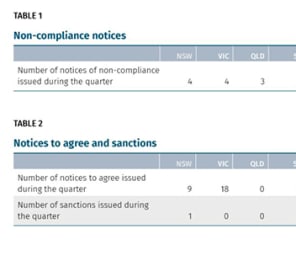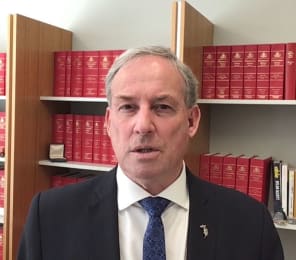Most in the sector would know COTA for its powerful advocacy around aged care issues on the national stage, but there is more to the group which was first established in 1958, according to its Chair Jane Halton who is driving hard for a new direction to its work.
Ms Halton is herself an experienced executive, serving over 30 years in the Australian Public Service, including as the Secretary of the Australian Department of Finance, Secretary of the Australian Department of Health, Secretary for the Department of Health and Ageing, and Executive Co-Ordinator (Deputy Secretary) of the Department of the Prime Minister and Cabinet.
Appointed by COTA Australia’s board of directors in 2017, she also sits on the boards of the ANZ Bank, Clayton Utz lawyers and the Australian Policy Institute and is an Adjunct Professor at the Universities of Canberra and Sydney.
Much work outside the public eye
Jane says since she first became involved with COTA in the early 1980s, the organisation has advocated across the full range of issues affecting older people including pensions, superannuation, affordable housing, transport, disability access and – of course – aged care, but much of their work goes on outside of the public eye.
For example, COTA manages the Strength for Life program to help older people maintain their mobility and fitness through strength training programs.
“One of the issues for me is that I want to grow the capacity of COTA to work much more energetically and visibly in some of these areas,” she said.
Building the capacity of the whole COTA movement to be heard
While COTA is one of the oldest and most respected organisations in advocating for older people’s issues to Government and other stakeholders, its Chair has a wider vision for its role.
“When there is a lot of competition for the ear of people in decision making roles and getting attention to issues in a media environment that is fractured and noisy, I am interested in ensuring we are in a position to advocate for older people and importantly make sure the right decisions are taken to provide them with a high quality of life and the access to services that they not only need but that they have the right to expect.”
Jane says while they are currently constrained by the small number of people in the secretariat, she wants to build up the capacity of the whole COTA movement to be the modern approach to advocacy and representation.
“What that looks like, we’re about to discover because we’re going on a journey,” she said.
New Constitution to allow members
To this end, COTA Australia adopted a new constitution in May last year which came into force on 1 July 2019 after the previous board – which was made up of the Presidents of each of COTA’s State and Territory organisations – worked out how they wanted to position COTA moving forward.
These changes also give COTA Australia greater flexibility in relation to membership (many of the States and Territory groups already have membership bases).
“I’m conscious that we want to work as a federation with more capacity to work with individual members as well as peaks and other bodies,” Jane said.
New Board members to drive vision
Jane has also recently brought three new members onto COTA Australia’s nine-member board:
Hugh Mackay AO, regarded as one of Australia’s top social researchers who headed up research for John Singleton throughout his marketing career and helped found the St. James Ethics Centre.
Lesley Podesta, formerly the First Assistant Secretary in the federal Department of Health & Ageing, she left Government to be Head of Global Partnerships & Advocacy for The Fred Hollows Foundation, followed by CEO of the violence prevention charity Alannah & Madeline Foundation
Jim Hazel, a veteran of the retirement village and supported living sectors in Australia who led the expansion of villages in the 1990s with Adelaide Bank before becoming the CEO of Prime Life, then the country’s largest village operator (now Lendlease retirement villages) and now the Chair of Omega Communities (private aged care) and Ingenia (land lease and rental communities) as well as a director of Bendigo Bank.
Skills based board with enthusiasm for advocacy
“We have someone with great business credentials who understands housing in a particular way,” Jane said.
“We have someone who is very experienced in the Not For Profit world and can advocate and connect a broad range of groups and we have one of the country’s greatest thinkers who has an unbelievable grasp of social dynamics and where the community is up to.”
“What I’ve looked to do is to build up a skills capacity-based board who all bring great energy and enthusiasm for the issues that affect older people,” Jane added.
And while the pandemic has delayed the board from progressing as fast as it would like, Jane says they are “contrary to stereotypes, unbelievably Zoom literate” and will have a new strategy agreed on and in place once the immediate crisis has passed.
“Watch this space,” Jane added.
More research capacity – and work with wider range of stakeholders
Asked where she would like to see COTA in five years’ time, Jane hopes to see the organisation with a greater research and advocacy capacity across a broader range of areas.
“At the moment, we are quite resource strained on our ability to work with a wide range of stakeholders,” she explained.
“I would like to put the organisation on a much more solid footing with the breadth of focus, skills, experience and networks of our new energised board working with the States and Territories to make sure we are a very reliable voice.”
Australians no longer retiring as they did
Jane believes that COTA’s services will be very much needed into the future too, given the increasingly complicated lives and circumstances of older people as more Australians work and live longer.
“We need to look at how we engage older people in our society and in our economy and not see it as a stage of life where people disappear into a caravan sunset,” she said.
“We need to make sure we advocate taking into account someone’s life experiences and continue to protect people who are vulnerable – that’s something we will not shy away from.”
We believe it.










